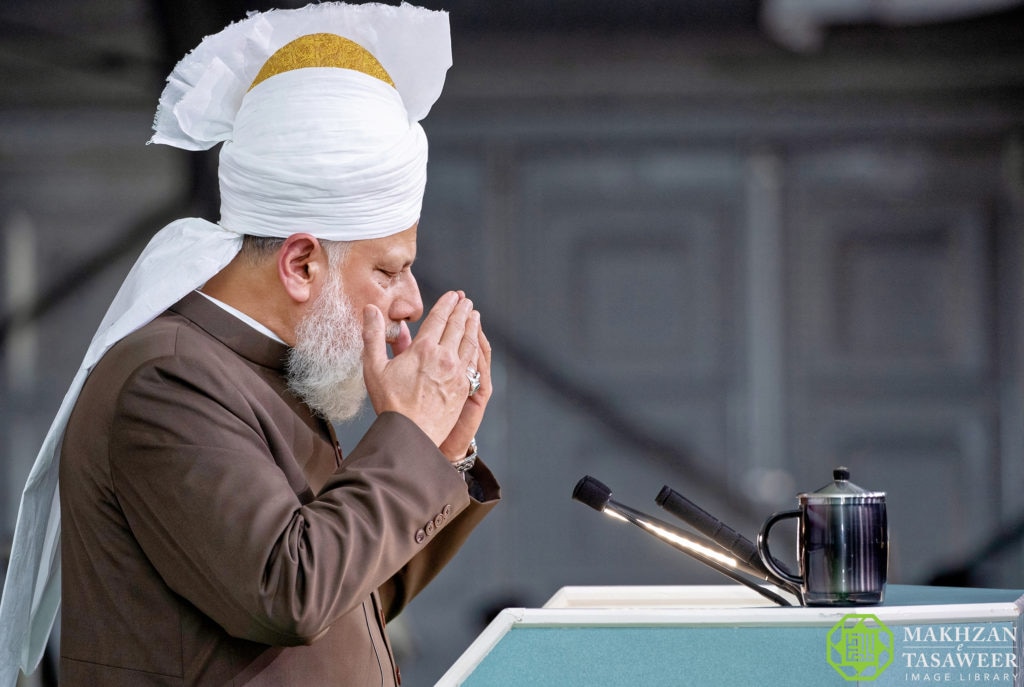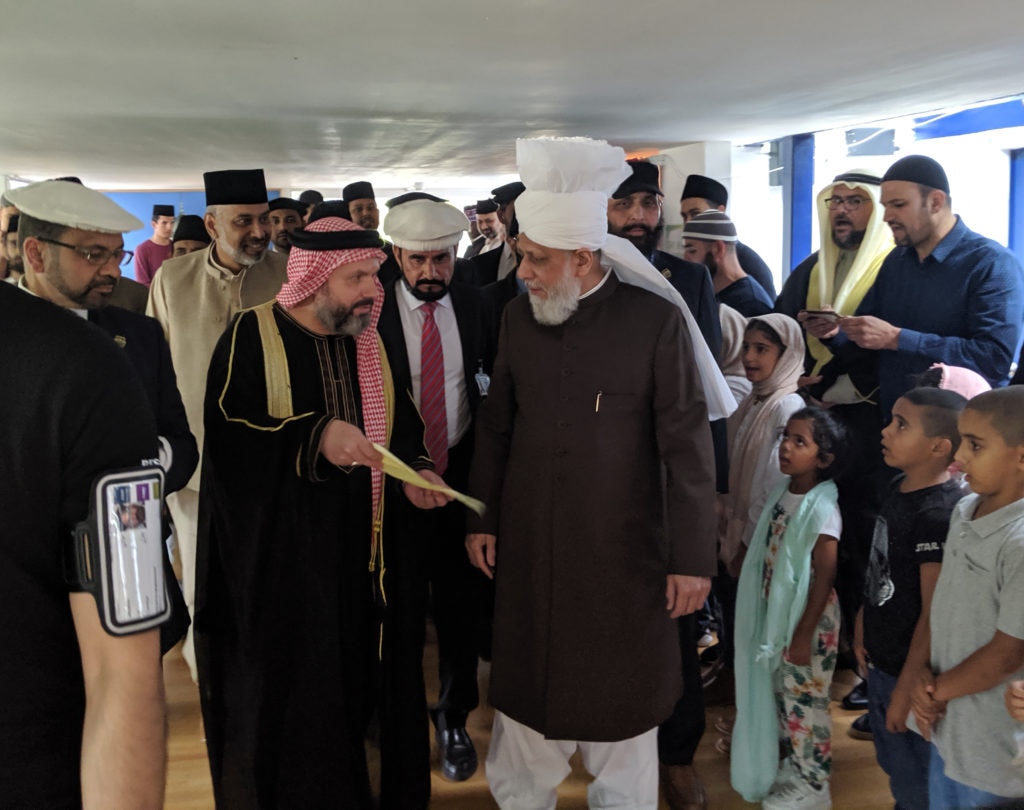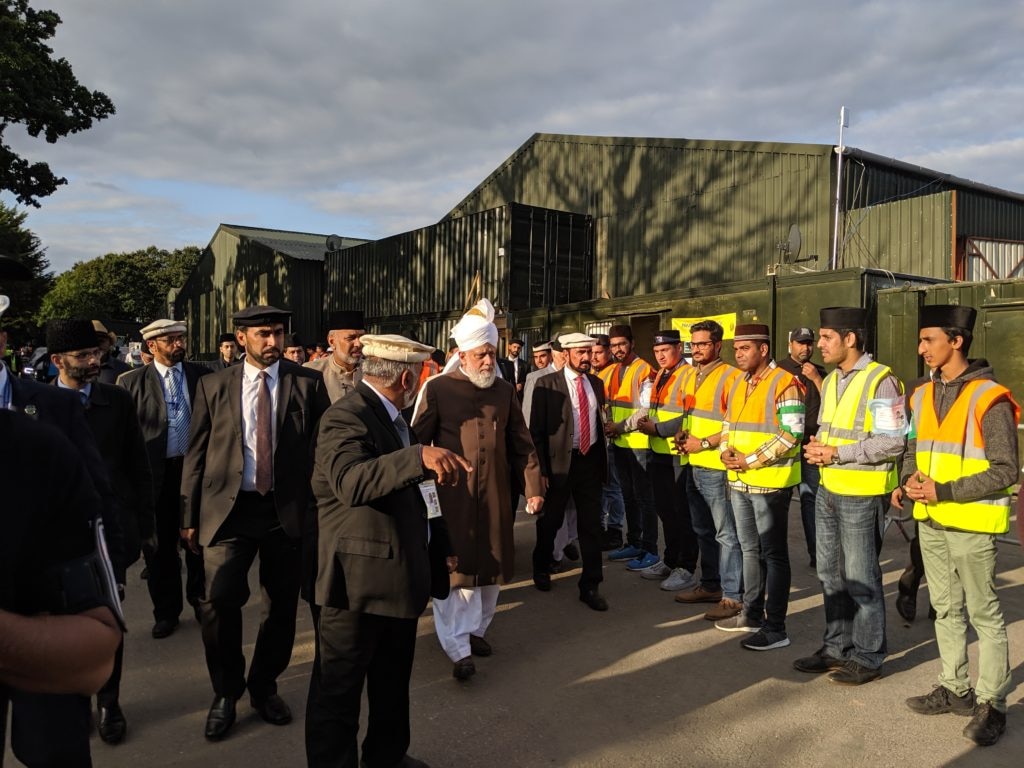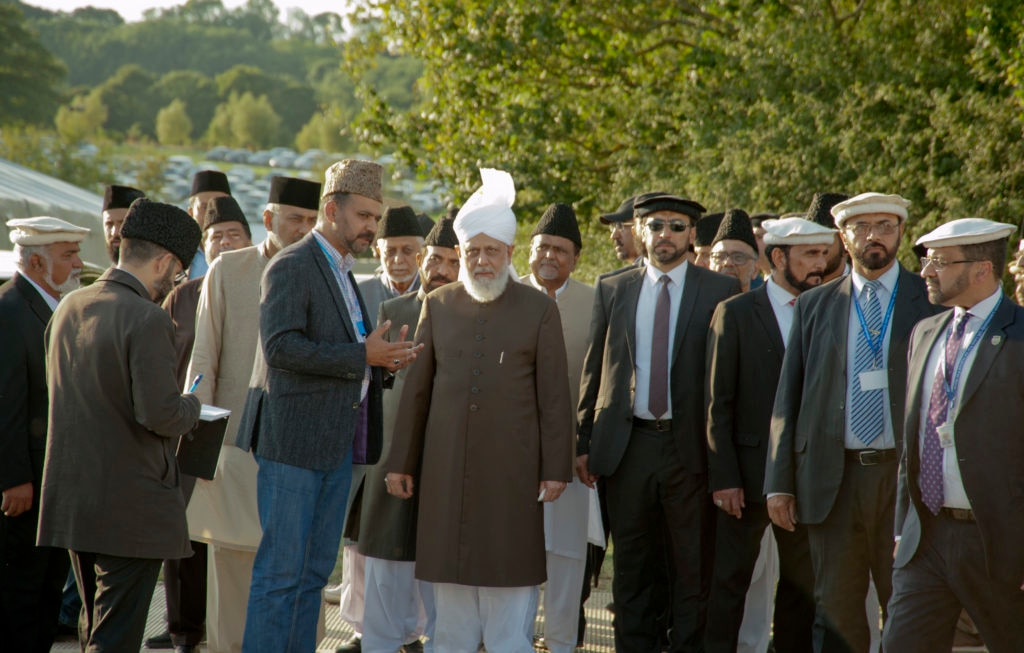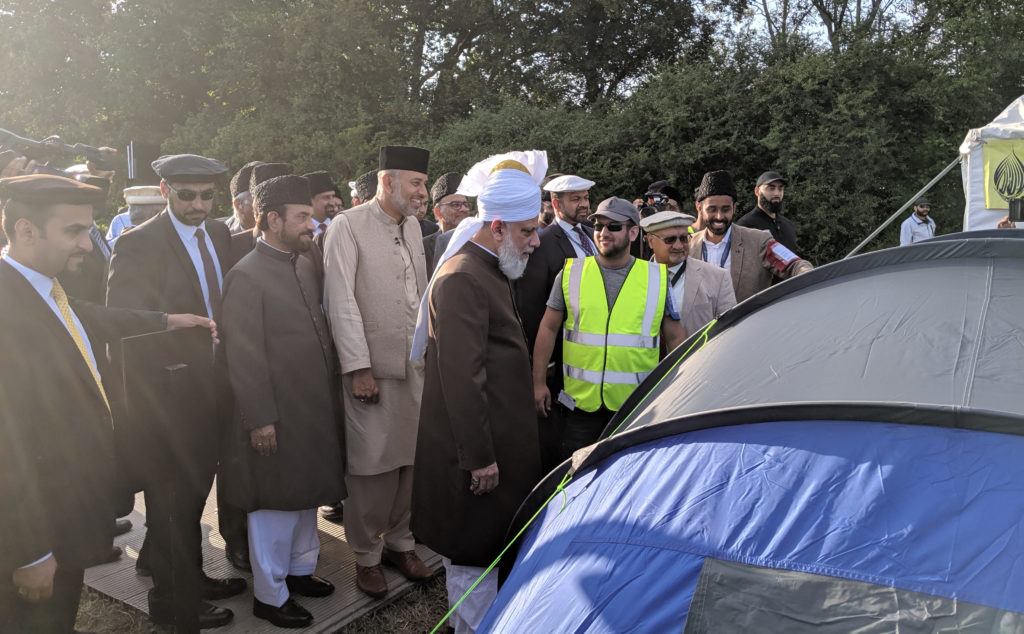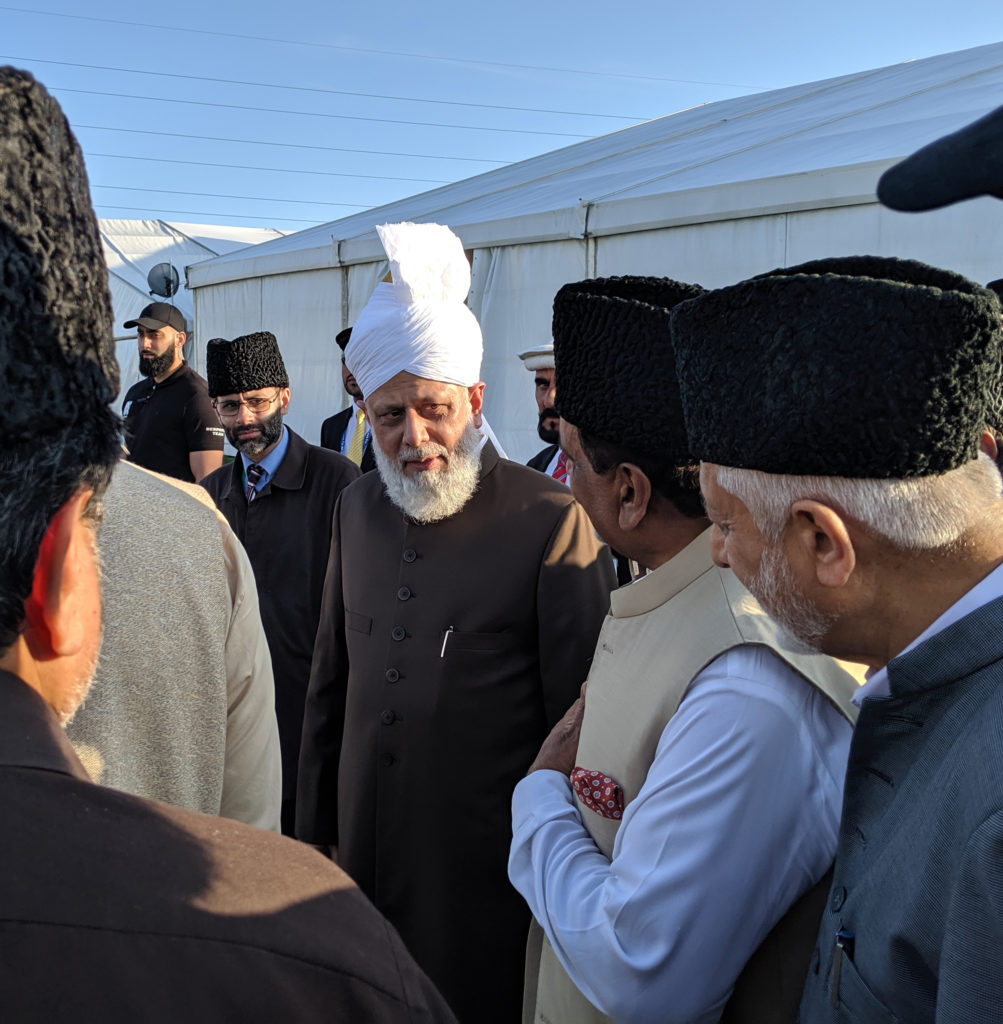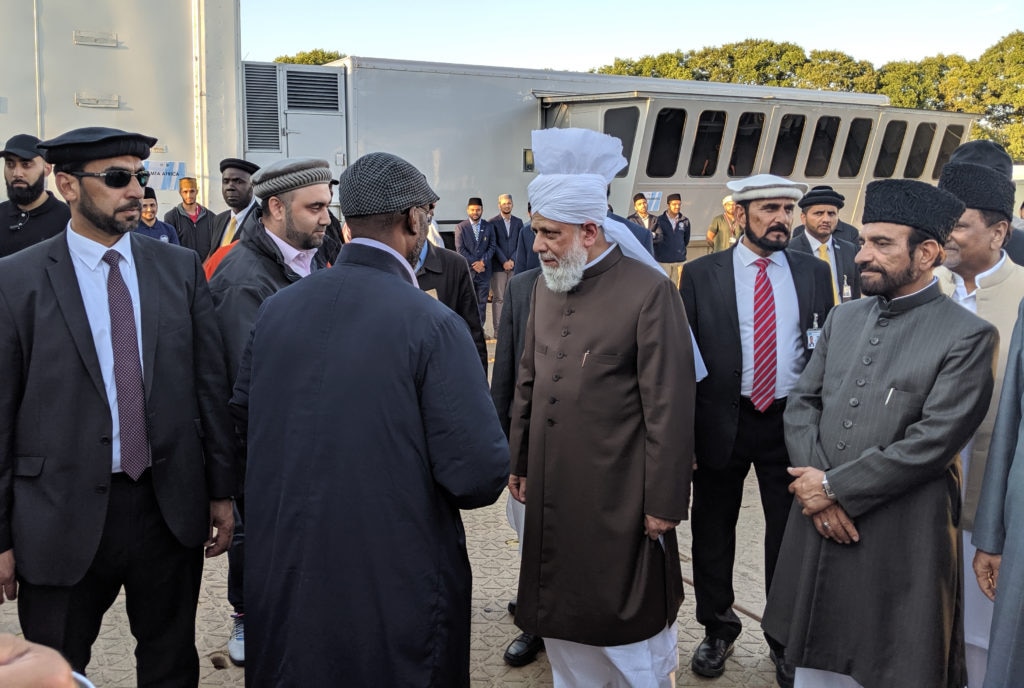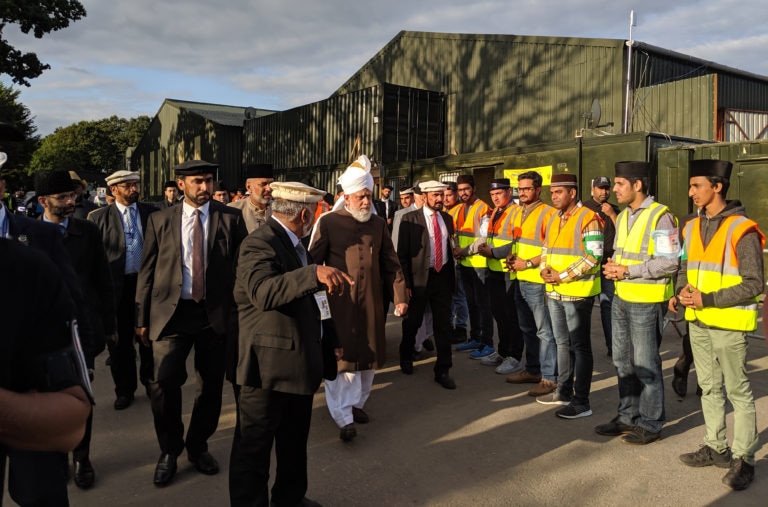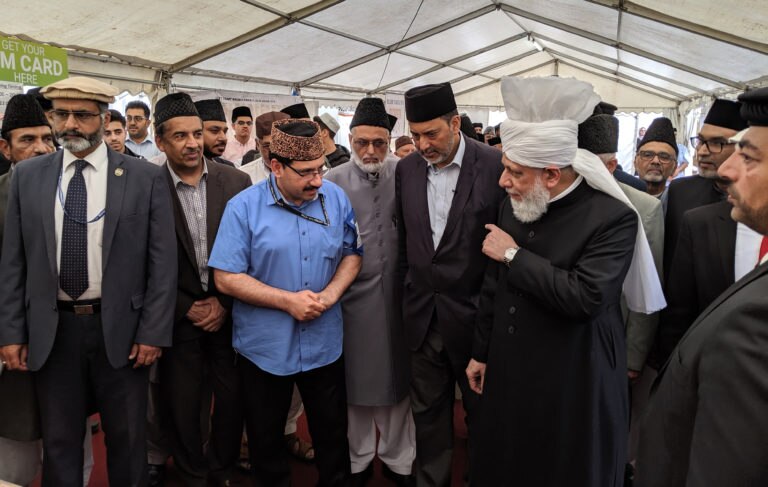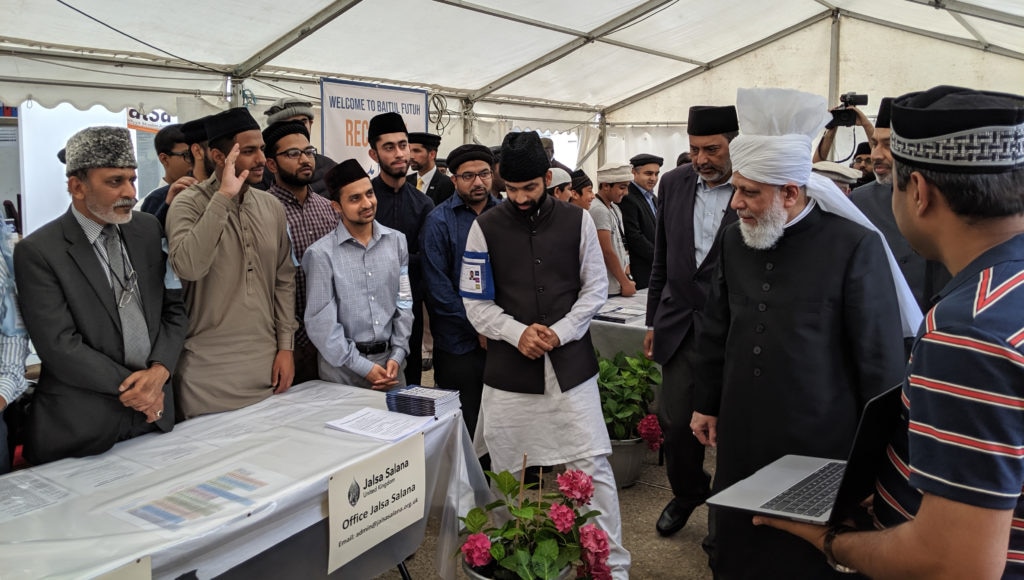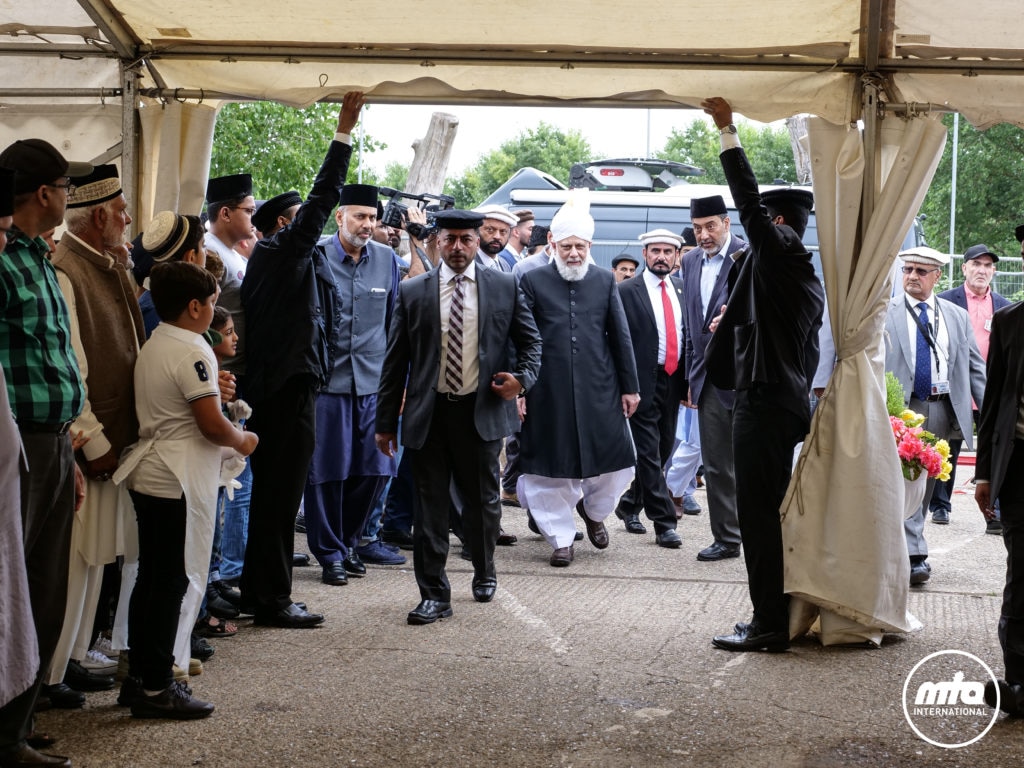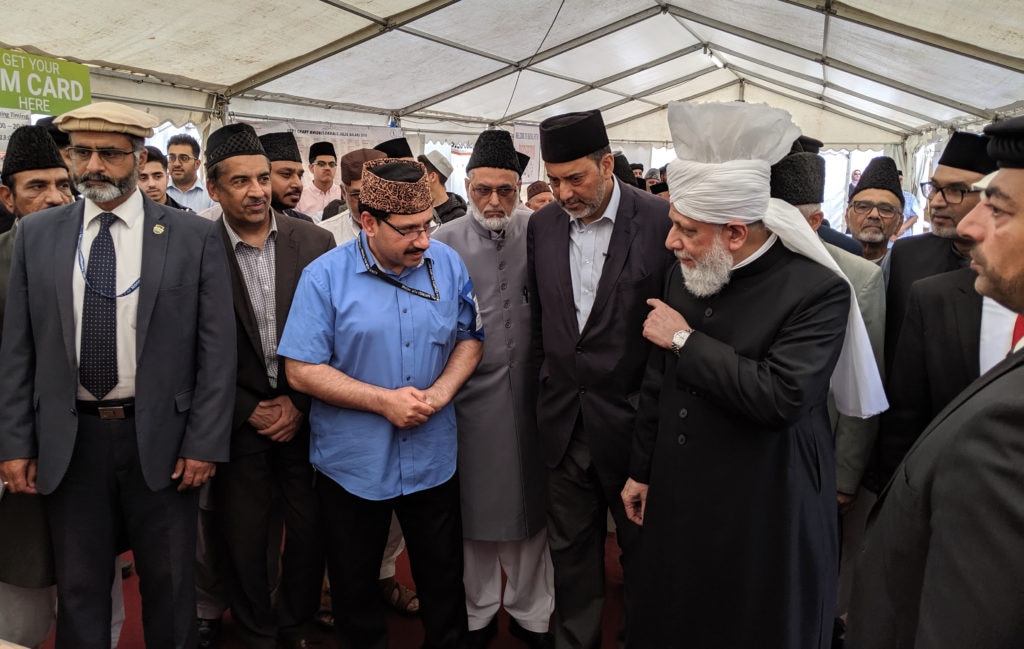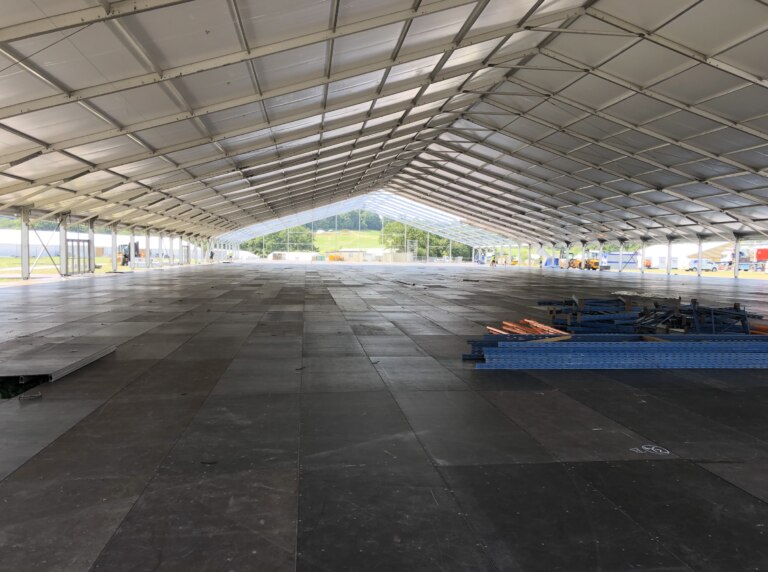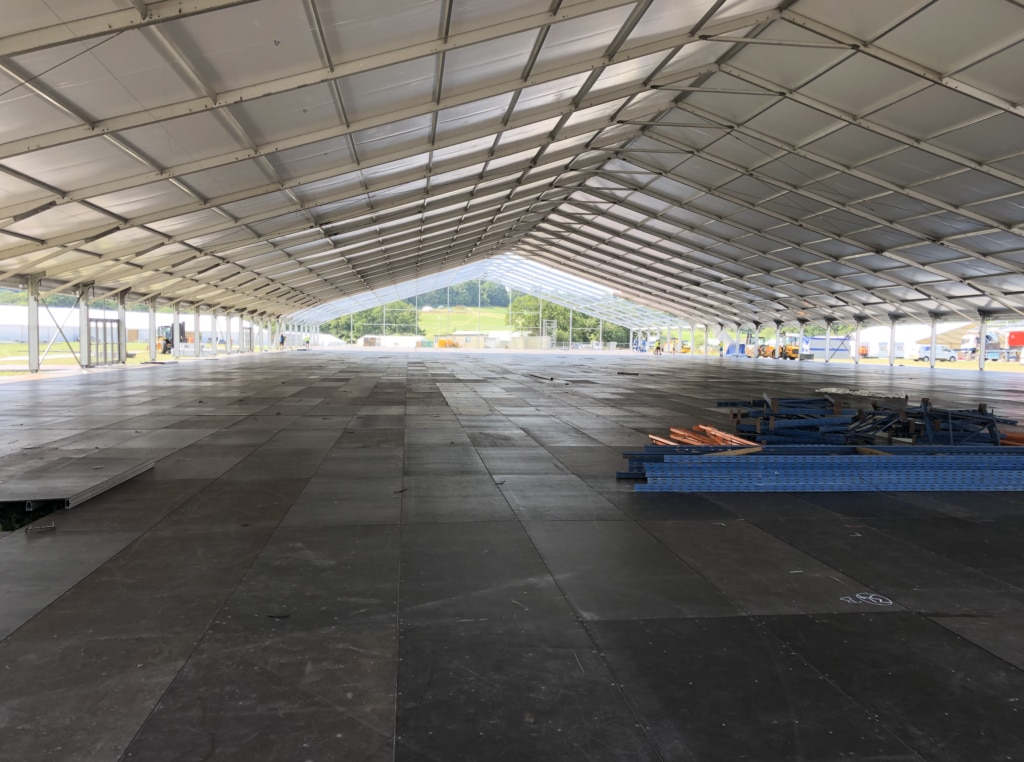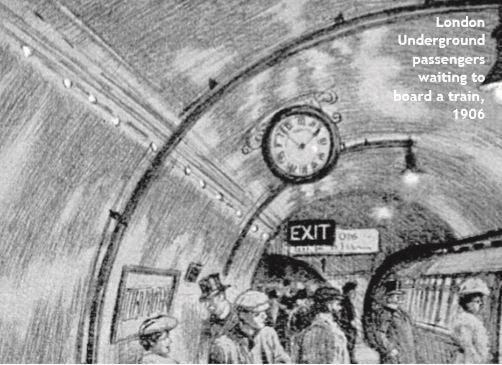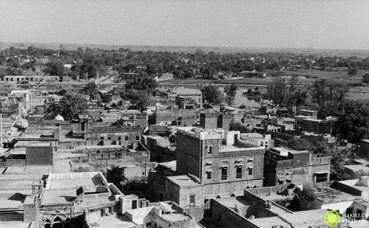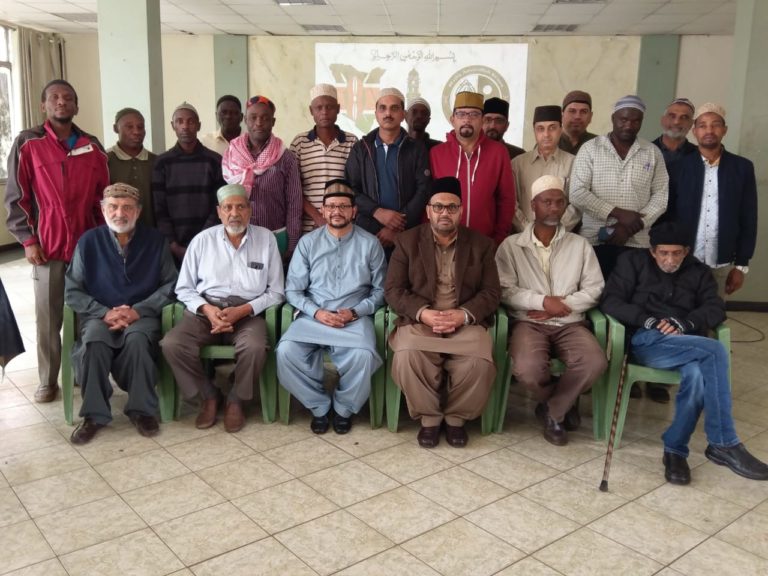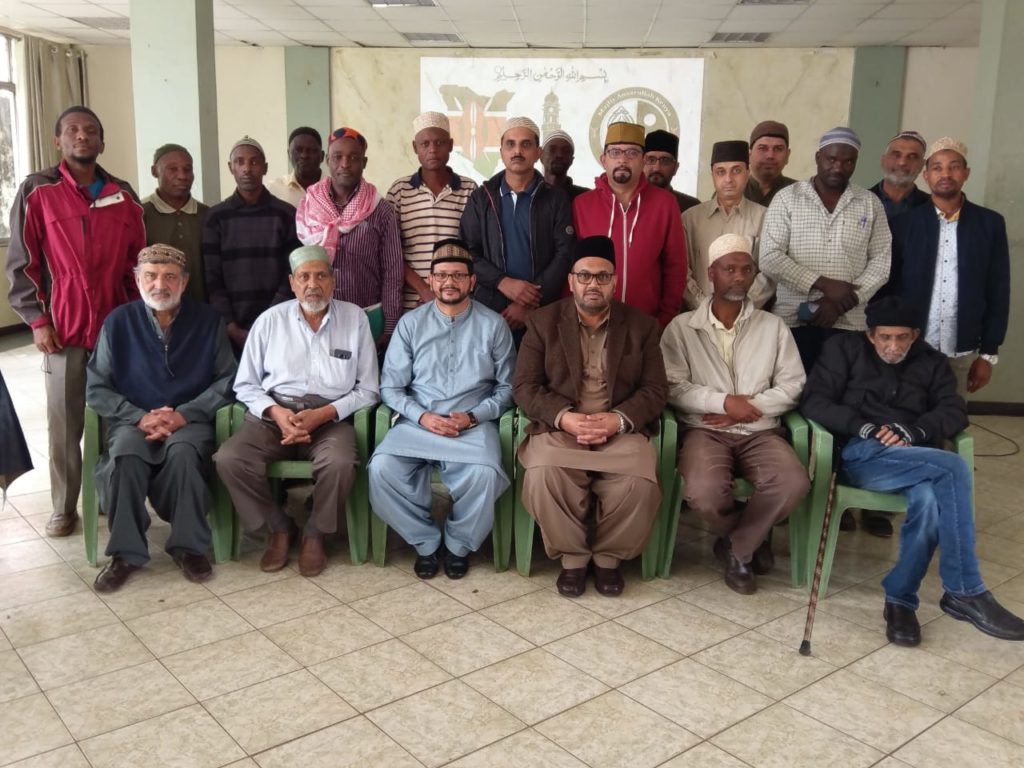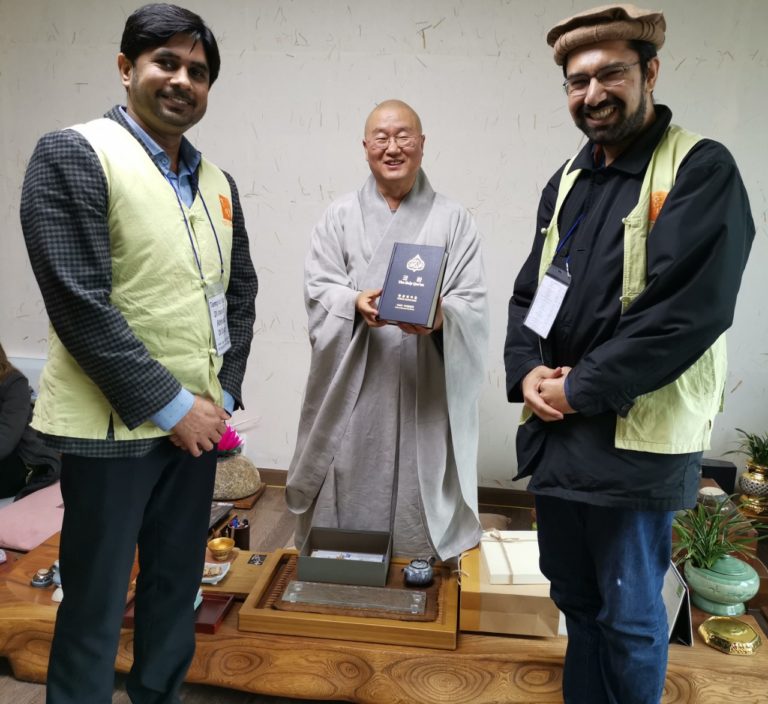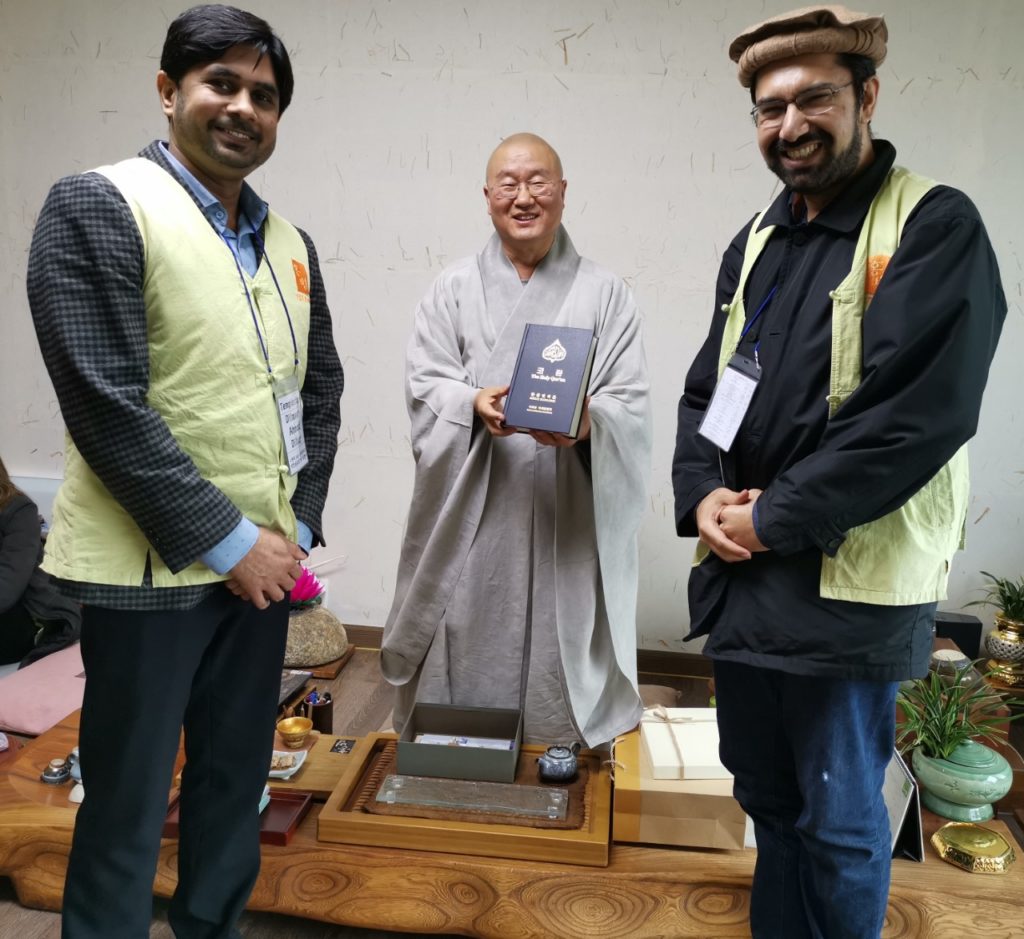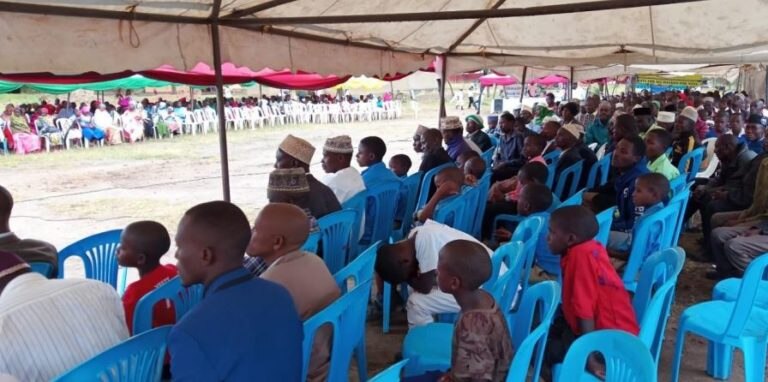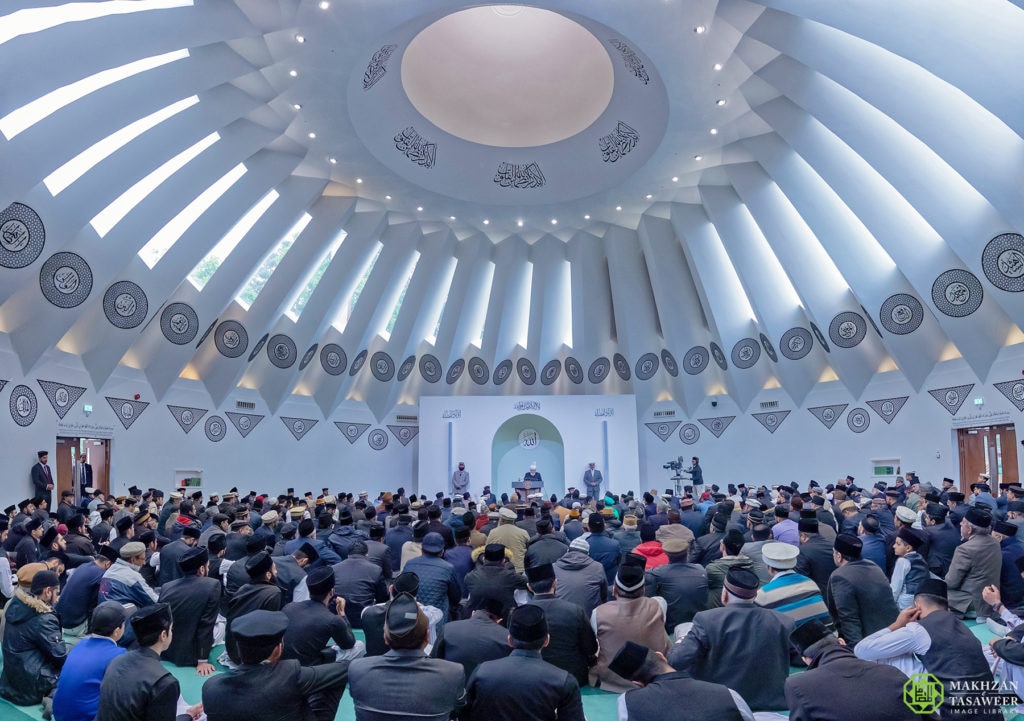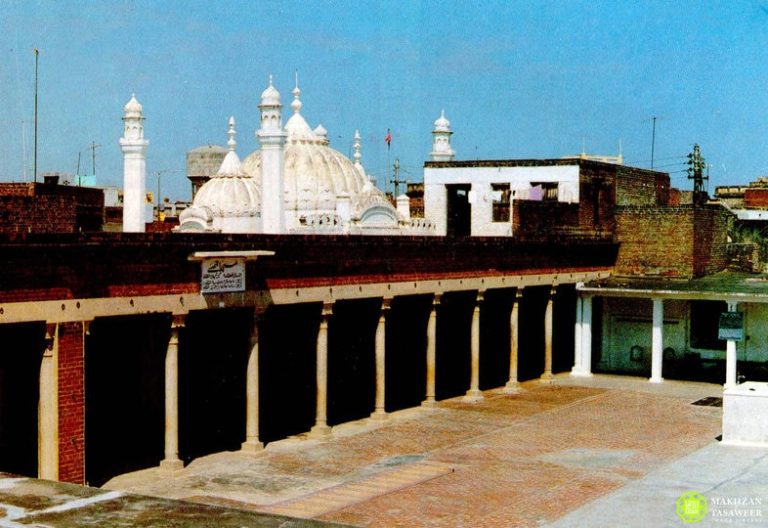Friday Sermon
28 June 2019
Hazrat Zaid Bin Harithahra
After reciting the Tashahud, Ta‘awuz and Surah al-Fatihah, Hazrat Khalifatul Masih Vaa stated:
There
are a few more accounts from the life of Hazrat Zaidra bin Haritha
which I shall relate today. In relation to an expedition which was sent to the
Banu Sulaim in Rabi-ul-Akhir 6 AH, Hazrat Mirza Bashir Ahmad Sahibra
writes in Sirat Khatamun-Nabiyyin:
“In this month, Rabi-ul-Akhir 6 AH, the
Holy Prophetsa dispatched a few Muslims to the tribe Bani Sulaim
under the command of his freed slave and previously adopted son, Zaidra
bin Harithah. This tribe resided in the region of Najd at a place called Jamum
and had been at war against the Holy Prophetsa for some time now. As
such, this tribe played a significant role against the Muslims in the Battle of
the Ditch as well. When Zaidra bin Harithah and his companions
reached Jamum, which was located at a distance of approximately 50 miles from
Medina, they found it to be empty. However, they were able to find the
whereabouts of where a portion of the Banu Sulaim were grazing their cattle,
from a woman named Halimah from the Muzainah tribe who was from among the
opponents of Islam. Therefore, benefiting from this intelligence, Zaidra
bin Harithah attacked the place. This sudden attack caused most of the people
to flee and they dispersed here and there. However, the Muslims were able to
capture a few prisoners and some cattle, which they took hold of and returned
to Medina. Coincidentally, the husband of Halimah was also among the prisoners,
and although he was an enemy of war, considering Halimah’s assistance, not only
did the Holy Prophetsa release Halimah without ransom but also
released her husband as an act of benevolence. Thereafter, Halimah and her
husband happily returned to their homeland.” (Sirat Khatamun-Nabiyyin,
Hazrat Mirza Bashir Ahmadra, p. 669)
In relation to another expedition of
Hazrat Zaidra bin Haritha which was sent to ‘Eis and took
place in Jamadi al-Ula 6 AH, Hazrat Mirza Bashir Ahmad Sahibra
writes in Sirat Khatamun-Nabiyyin:
“Not many days had passed
since the return of Zaidra bin Harithah, when the Holy Prophetsa
sent him from Medina once again during the month of Jamadi al-Ula, commanding
170 companions. The scholars of Sirathave written that the cause of
this expedition was that a caravan of the Quraish was arriving from Syria and
that the Holy Prophetsa had sent this squadron for the interception
of this caravan … However, here it is sufficient to allude to the fact that
these caravans of the Quraish were always armed and whilst travelling between
Mecca and Syria they passed very closely by Medina, and so they were a constant
threat. Other than this, as has already been mentioned in the preliminary
discussion on this topic, these caravans would provoke the tribes of Arabia
against the Muslims wherever they passed. Due to this, a dangerous fire of
animosity had been ignited throughout the country against the Muslims, due to
which their interception was necessary.
“In any case, upon receiving news of this
caravan, the Holy Prophetsa dispatched Zaidra bin
Harithah to meet it. He moved forward with such intelligence, seizing the
opportunity, that he was able to successfully reach Eis and intercepted the
caravan. Eis is the name of a place situated at a distance of four days’ travel
from Medina, towards the ocean. Since this was a sudden attack, the people of
the caravan were unable to combat this assault of the Muslims. They left all
their belongings and fled. Zaidra captured a few prisoners and took
hold of the caravan’s load, set off to Medina and presented himself before the
Holy Prophetsa.”
It should be remembered that every
expedition that was sent, or any battle that took place was because there was
always news of some threat from the approaching caravans and that they were
conspiring against the Muslims in order to launch an attack.
Hazrat Zaidra bin Haritha was
sent on another expedition in Jamadi al-Akhir in 6 AH which was sent to Tarif.
In relation to this, Hazrat Mirza Bashir Ahmad Sahibra writes:
“Sometime after the Ghazwahof Banu
Lihyan, in Jamadi al-Akhir 6 AH, the Holy Prophetsa dispatched a
squadron of 15 men in the command of Zaidra bin Haritha towards
Tarif, which was located at a distance of 36 miles from Medina. In those days,
the people of Banu Thu‘labah resided there, but before Zaidra bin
Haritha could reach it, the people of this tribe received a timely alert and
dispersed. After a temporary absence of a few days, Zaidra bin
Haritha and his companions returned to Medina.” Neither did any battle take
place and nor did they go after and search for them. (Sirat
Khatamun-Nabiyyin, Hazrat Mirza Bashir Ahmadra, pp. 690-681)
Then there is another expedition of Hazrat
Zaidra bin Haritha towards the location of Hisma, which took place
in Jamadi al-Akhir 6 AH. In relation to this, Hazrat Mirza Bashir Ahmad Sahibra
writes:
“In this month, Jamadi al-Akhir, the
Holy Prophetsa sent Hazrat Zaidra bin Haritha with 500
Muslims towards Hisma to the north of Medina, which was the settlement of the
Banu Juzam. The purpose of this expedition was because a companion of the Holy
Prophetsa named Dihyah Kalbira was returning from Syria
after meeting the Caesar of Rome. He was accompanied by goods as well, some of
which were in the form of gifts etc. from Caesar, while some were goods of
trade. When Dihyahra passed by the region of the Banu Juzam, the
chief of the tribe, Hunaid bin Arid, took a party of his tribe and attacked
Dihyahra, and seized all his goods to the extent that they left
nothing on the body of Dihyahra except for a few torn clothes. When
news of this reached the Banu Dubaib, which was a branch of the Banu Juzam,
some of whom had become Muslim, they chased this party of the Banu Juzam and
reclaimed the stolen goods. Dihyahra took these goods and returned
to Medina. Upon reaching there, Dihyahra related all the
circumstances to the Holy Prophetsa, upon which the Holy Prophetsa
sent Hazrat Zaidra bin Haritha, and sent Dihyahra along
with Zaidra as well.
“The squadron of Zaidra
progressed forward to Hisma, journeying very intelligently and cautiously,
hiding at day and travelling by night. They attacked the Banu Juzam in the
morning exactly. The Banu Juzam retaliated but were unable to successfully
confront the sudden attack of the Muslims and fled after a brief fight. The
battlefield remained in the dominance of the Muslims and Hazrat Zaidra
bin Haritha returned with many goods, wealth and cattle, as well as
approximately 100 prisoners. However, Zaidra had not yet reached
Medina when the Banu Dubaib tribe, which was a branch of the Banu Juzam,
received news of this expedition of Zaidra. In the company of their
chieftain, Rifa‘ah bin Zaidra, they presented themselves before the
Holy Prophetsa and said, ‘O Messengersa of Allah! We have
become Muslims and we have been granted a written document for the protection
of the rest of our people. Why then were the people of our tribe included in
this attack?’ The Holy Prophetsa responded, ‘Yes, you are correct,
but Zaid was not aware of this.’ The Holy Prophetsa repeatedly
expressed his grief for the people who were killed on this occasion. Upon this,
a companion of Rifa‘ahra named Abu Zaidra said, ‘O Messengersa
of Allah! We ask nothing for those who were killed, this was an accident due to
a misunderstanding which has passed. But as for those who are alive, the
property of our tribe which has been seized by Zaid should be returned to us.’
The Holy Prophetsa said, ‘Yes, you are correct,’ and he immediately
sent Hazrat Alira towards Zaidra. He also sent his own
sword as a symbol with the message to Zaidra that all the prisoners
and wealth which had been seized from this tribe be released at once. Upon receiving
this order, Zaidra immediately released the prisoners and returned
the wealth acquired in spoils as well.” (Sirat
Khatamun-Nabiyyin, Hazrat Mirza Bashir Ahmadra, pp. 681-682)
Thus, this was the noble example of the
Holy Prophetsa in relation to honouring his covenant. He did not
inflict any injustice upon them. It is possible that some of the tribes may
have intentionally took part in the battle, but since this was a
misunderstanding on the part of the Muslims, therefore the Holy Prophetsa
released them all and retuned their wealth.
Then there is mention of another
expedition of Hazrat Zaidra bin Haritha towards Wadi al-Qura which
took place in Rajab 6 AH. It is stated:
“After approximately one month after the
expeditionof Hisma, the Holy Prophetsa once again sent Zaidra
bin Haritha to Wadi al-Qura. When the squadron of Zaidra bin Haritha
reached Wadi al-Qura, the people of the Banu Fuzarah were ready for combat. As
such, numerous Muslims were martyred in this expedition, and even Zaidra
himself was badly wounded, but God saved him by His grace.”
Hazrat Mirza Bashir Ahmad Sahibra
states,
“Wadi al-Qura, which has been mentioned
with relevance to this expedition, is an inhabited valley situated on the
Syrian route north of Medina, wherein many settlements resided. This is why it
became known as Wadi al-Qura, i.e. the Valley of Settlements.” (Sirat
Khatamun-Nabiyyin, Hazrat Mirza Bashir Ahmadra, pp. 682-683)
The Battle of Mu‘tah took place in 8 AH.
Mu‘tah is a place near Balqa in Syria. Describing the causes and motives behind
this battle, Allamah Ibn Saad writes that the Messengersa of Allah
appointed Harith bin Umair as an envoy and sent him with a letter to the king
of Basra. When he arrived at Mu‘tah, he was martyred by Shurahbeel bin Amr
Ghassani. None of the envoys of the Holy Prophetsa were martyred
except Hazrat Harith bin Umair. In any case, this incident was very distressing
for the Holy Prophetsa.
When he called the people, who numbered
3,000, they immediately gathered in Jurf. The Holy Prophetsa
announced that Zaidra bin Harithah was the commander over all of
them. He prepared a white flag to give to Hazrat Zaidra and
instructed him, “Go to the place where Harith bin Umair was martyred and to
convey the message of Islam to those people. If they accept, then well and
good. Otherwise, beseech Allah’s help against them and fight against
them.”
The Battle of Mu‘tah was fought in 8 AH,
during the month of Jamadi al-Awwal.
(Al-Tabaqaat-ul-Kubra, Vol. 2, pp. 97-98, Dar-ul-Kutub
al-Ilmiyyah, Beirut, 1990) (Al-Tabaqaat-ul-Kubra, Vol. 3, p. 34,
Dar-ul-Kutub al-Ilmiyyah, Beirut, 1990)
It is narrated by Hazrat Abdullah bin
Umar, “Allah’s Messengersa appointed Zaidra bin Haritha
as the commander of the army during the Battle of Mu‘tah and said, ‘If Zaid is
martyred, Jafar should take over his position, and if Jafar is martyred,
Abdullah bin Rawaha should take over his position.’” This army is also called
“Jaishul Umaraa” [Army of Leaders]. (Sahih al-Bukhari, Kitab-ul-Maghazi,
Baab Ghazwah Mautah, Hadith no. 4261) (Musnad Ahmad bin Hanbal, Vol. 7,
p. 505, Hadith no. 22918)
This is mentioned in Sahih al-Bukhari
as well as Musnad Ahmad bin Hanbal. It is also mentioned in the
narration in which Hazrat Jafarra said to the Messengersa
of Allah, “I did not think that you would appoint Zaid as an Amir over me.” The
Holy Prophetsa replied, “Never mind about that for you do not know
what is better.” (Al-Tabaqaat-ul-Kubra, Vol.
3, p. 34, Dar-ul-Kutub al-Ilmiyyah, Beirut, 1990)
Hazrat Musleh-e-Maudra, while
mentioning the Battle of Mu‘tah, said … (I have alluded to this particular
incident a few weeks, or months, ago. Nevertheless, since I am mentioning
accounts of Hazrat Zaidra, I will repeat this again.)
Hazrat Musleh Maudra writes:
“The Holy Prophetsa appointed
Hazrat Zaidra as the commander of this military campaign. However,
he also added, ‘I am appointing Zaidra as the commander of the army.
If Zaidra is killed while fighting, Jafarra should take
over the command in his position, and if Jafarra is killed, Abdullahra
bin Rawaha should take over the command and even if he is killed then anyone
whom the Muslims collectively agree upon, should take up the command of the
army.’ As he said these words, a Jew was also sitting in his company. He said,
‘Although I do not believe you to be a prophet, but if you are truthful then
none of these three individuals would return alive because anything uttered by
a prophet is certainly fulfilled.’”
(In the previous sermon when I quoted this
incident, it mentioned that the Jew went to Hazrat Zaidra and stated
the aforementioned)
Hazrat Musleh-e-Maudra further
states:
“At this, Hazrat Zaidra
replied, ‘Regardless of whether I return from this battle alive or not, it is
an undeniable truth that our Messengersa is truthful.’ Allah’s
wisdom so ordained that this incident was fulfilled exactly as foretold. Hazrat
Zaidra was martyred. Then, Hazart Jafarra took up the
command and he too was martyred. Then, Hazrat Abdullahra bin Rawaha
took up the command of the army and was also martyred. It was possible that in
this moment, the Muslim army could have dispersed but Hazrat Khalidra
bin Waleed took the flag in his hand on the behest of the Muslims. Allah gave
victory to the Muslims through him and he returned the army safely.” (Fareeza-e-Tabligh
Aur Ahmadi Khawateen, Anwar-ul-Aloom, Vol. 18, p. 406-406)
In Bukhari, we find this narration
in the following manner. Hazrat Anasra bin Malik narrates that the
Holy Prophetsa said that Zaidra took the flag and was martyred.
Following this, Jafarra grabbed hold of it and was also martyred.
Then, Abdullahra bin Rawaha took the flag and he was martyred as
well. As the Holy Prophetsa made this announcement, tears were
flowing from his eyes. The Holy Prophetsa then said that following
this, Khalid bin Waleed grabbed hold of the flag even though he was not among
the appointed leaders and he was granted victory. (Sahih Al-Bukhari,
Kitab-ul-Janaiz, Hadith no. 1246)
When the news of the martyrdom of Hazrat
Zaidra bin Haritha, Hazrat Jafarra and Hazrat Abdullahra
bin Rawaha reached the Holy Prophetsa, he stood up and informed them
first about Zaidra, “O Allah, forgive Zaid! O Allah, forgive Zaid! O
Allah, forgive Zaid!” Following this, the Holy Prophetsa said, “O
Allah, forgive Jafar and Abdullah bin Rawaha.” (Al-Tabaqaat-ul-Kubra, Vol.
3, p. 34, Dar-ul-Kutub al-Ilmiyyah, Beirut, 1990),
Hazrat Aishara relates that
when Hazrat Zaidra bin Haritha, Hazrat Jafarra and
Abdullahra bin Rawaha were martyred, the Holy Prophetsa
sat down in the mosque and signs of grief and sorrow were visible on his face.
(Sunan Abi Daud, Kitab-ul-Janaiz, Hadith no. 3122)
In Tabaqat-ul-Kubra it is written
that when Hazrat Zaidra was martyred, the Holy Prophetsa
went to his family in order to offer his condolences. When the Holy Prophetsa
went there, his daughter was in such a state where signs of weeping were
visible on her face. Upon this, tears started to flow from the eyes of the Holy
Prophetsa as well. Hazrat Zaidra bin Abada said, “O
Prophet of Allah, what is this? Tears are flowing from your eyes!” The Holy
Prophetsa replied:
ھٰذَا
شَوْقُ الْحَبِیْبِ اِلٰی حَبِیْبِہٖ
That is,
“This is the love of a beloved for his beloved.” (Al-Tabaqaat-ul-Kubra, Vol.
3, p. 34, Dar-ul-Kutub al-Ilmiyyah, Beirut, 1990)
Mentioning the martyrdom of Hazrat Zaidra,
Allama ibn Saad writes that the Holy Prophetsa appointed Hazrat Zaidra
bin Haritha as the leader of the army sent to Mu‘tah and, in fact, gave him
preference above all the other leaders appointed for this expedition. When the
Muslims and the idolaters confronted each other, the leaders appointed by Holy
Prophetsa were fighting on foot. Hazrat Zaidra took the
flag and commenced the battle and others also joined him in the battle. During
the battle, Hazrat Zaidra was pierced by a spear and was martyred as
a result. At the time of his martyrdom, he was fifty-five years old. The Holy
Prophetsa led the funeral prayer of Hazrat Zaidra and
said, “O people! Seek forgiveness for Zaid, he swiftly entered the abode of
paradise.” (Al-Tabaqaat-ul-Kubra, Vol.
3, pp. 33-34, Dar-ul-Kutub al-Ilmiyyah, Beirut, 1990),
Hazrat Usamara, the son of
Hazrat Zaidra, relates that the Holy Prophetsa would take
him, i.e. Hazrat Usamara, and Hasanra and say, “O Allah!
Love both of these as I love both of them.” (Sahih Al-Bukhari,
Kitab-ul-Fazail Ashaab-e-Nabi, Hadith no. 3735)
Hazrat Jabalara relates that
until the Holy Prophetsa set out for a battle, he would not give his
weapons to anyone but Hazrat Alira and Hazrat Zaidra. (Kanzul
Ummal, Vol. 13, p. 397, Hadith no. 37066, Muithitha Al-Risala, Beirut,
1985)
Hazrat Jabalara mentions
another narration that the Holy Prophetsa was given two camel
saddles as a gift. He kept one himself and gave the other one to Hazrat Zaidra.
(Kanzul Ummal, Vol. 13, p. 397, Hadith no. 37067, Muithitha Al-Risala,
Beirut, 1985)
Hazrat Jabalara relates another
tradition that the Holy Prophetsa was gifted two cloaks. He kept one
for himself and gave the other one to Hazrat Zaidra. (Al-Mustadrik
Ala’ Sahihain Li Al-Hakim, Vol. 3, p. 241, Kitab Marifat Al-Sahaba, Hadith
no. 4963, Dar-ul-Kutb Al-Ilmiyyah, Beirut, 2002)
In another place it is mentioned that
Hazrat Zaidra bin Haritha was called the beloved of the Holy Prophetsa.
In relation to Hazrat Zaidra, the Holy Prophetsa said,
“The most beloved to me from among the people is he on whom Allah has bestowed
His favour; and that is Zaid.” Allah the Exalted bestowed His favour upon him
through his acceptance of Islam and the Holy Prophetsa did so by
granting him freedom.” (Al-Istiaab Fi Ma‘rifa Al-Sahab, Vol. 2, p. 117,
Zaid bin Haritha, Dar-ul-Kutb Al-ilmiyyah, Beirut, 2010)
The gist of what history books have
recorded about the Battle of Mu‘tah is that in order to respond to the earlier
battle that took place in Mu‘tah, the Holy Prophetsa prepared a huge
army in the month of Safar during the 11th year following the
migration and the Holy Prophetsa instructed the people to prepare
for battle against the Byzantine Empire. Although there is no direct connection
with this particular battle to Zaidra bin Harithah as he was
martyred in the earlier battle that took place at Mu‘tah, nonetheless his name
is mentioned in reference to the preparation of the army, therefore I shall
mention that part of history here.
A part of this has probably been mentioned
already a while ago during the mention of Hazrat Usamara. In any
case, Hazrat Usamara had not taken part in the Battle of Badr – at
the time of the battle he was far too young – but because at that time I was
mentioning the Companionsra in general, therefore he was also
mentioned with reference to it. Nonetheless, on the day after this army was
prepared, the Holy Prophetsa called over Hazrat Usama bin Zaidra,
and, handing over the command of this expedition to Hazrat Usamara,
said, “Go towards the place where your father was martyred,” and, regarding
their departure toward the region of Syria, the Holy Prophetsa said,
“When you depart, travel swiftly and reach the enemy before news of your
approach reaches them. Then, first thing in the morning, attack the Ahl-e-Ubna
(i.e. the people of Balqa).”
In Syria, Balqa is the name of a region
situated near Mu‘tah which was where the Battle of Mu‘tah took place. And Balqa
is a region situated in Syria between Damascus and the Valley of Quraa. With
regard to this place, it is recorded that a person from the progeny of Prophet
Lotas named Baaliq populated the area. In relation to Daroom, it is
stated that it is a place found in Palestine, near Ghaza, which is situated on
the route to Egypt.
In any case, the Holy Prophetsa
instructed them, “Raze these places to the ground with your horses, to avenge
Hazrat Zaidra.”
The Holy Prophetsa further said
to Usamara, “Take guides who can show you the way as well, and also
take such people as can perform the duty of reconnaissance – people who can
properly inform you of the prevailing situation and circumstances there. May God
Almighty grant you success, and return quickly.”
At the time of this battle, the age of
Hazrat Usamara was between 17 and 20 years old. The Holy Prophetsa
tied a flag with his own hands and said to Usamara, “With the name
of Allah, strive in His path and battle him who denies God.” Hazrat Usamara
took this flag in his hands and left, delegating the flag’s responsibility to
Hazrat Buraidahra. This army began to gather at a place called
Juruf. Juruf is also a place situated about three miles from Medina. The total
number of this army is recorded as 3,000. All of the Ansar and Muhajireen
companions of the Holy Prophetsa were part of this army. Among them
were some very prominent companions such as Hazrat Abu Bakrra,
Hazrat Umarra, Hazrat Ubaidahra bin Al-Jaraah, and Hazrat
Saadra bin Abi Waqas, but the commander appointed over this army was
Hazrat Usamara, who was only 17 or 18 years old. Some individuals
did object that a young boy had been made the Amir at such a young age over the
companions who migrated with the Holy Prophetsa in the very early
period of Islam. At this, the Prophetsa of Allah expressed his
displeasure. He had a cloth tied around his head and had over himself a mantle.
He stood at the pulpit and announced, “O ye people, what is this thing that has
reached me which you say about Usamara being made commander over
you? If you have objected my decision in making Usama the Amir over you, then
know that you have also objected to my appointment of his father as Amir before
this.”
Then, the Holy Prophetsa went
on to say, “I swear to God, he also possessed the qualities of leadership,
(referring to Hazrat Zaidra bin Harithah) and after him, his son
also possesses within himself the qualities of leadership. He was among those
people who were dearest to me, and both of these (meaning father and son)
deserve all the good in the world.”
Then, the Holy Prophetsa
instructed, “So take a lesson of goodness from him, meaning Hazrat Usamara,
for he is among the very best of you.”
This took two days prior to the Holy
Prophet’ssa demise, i.e. Saturday, 10 Rabi al-Awwal. The Muslims
departing with Hazrat Usamara had said farewell to the Holy Prophetsa
and joined the army at a place called Juruf. The illness of the Holy Prophetsa
had increased, yet he continued to insist on sending forth the army of Hazrat
Usamara.
On the Sunday, the state of the Holy
Prophetsa had worsened even further and Usama returned, the Holy
Prophetsa was in a state of semi-consciousness and people were
giving him medicine that day. Hazrat Usamara lowered his head and
kissed the Holy Prophetsa. The Holy Prophetsa could not
speak, but he raised both his hands to the sky and placed them on the head of
Hazrat Usamara. Hazrat Usamara states that he understood
that the Holy Prophetsa was praying for him. Hazrat Usamara
then left to re-join the army. On Monday, the Holy Prophet’ssa
health somewhat improved. He then said to Hazrat Usamara, “Depart
with the blessings of God Almighty”. Hazrat Usamara took leave from
the Holy Prophetsa and set off, instructing his men to march on.
All of a sudden, a man came and brought a
message from his mother, Hazrat Umm-e-Aimanra, that it seemed the
Holy Prophetsa was in his final moments and that his health had
deteriorated significantly. As soon as he heard this terrible news, Hazrat
Usamara returned with Hazrat Umarra and Hazrat Abu
Ubaidahra to see the Holy Prophetsa. When they reached,
they found him taking his last breath.
On Monday 12 Rabi al-Awwal, after sunset,
the Holy Prophetsa passed away. As a result, the Muslim army
returned from Juruf to Medina. Hazrat Buraidahra planted the flag of
Hazrat Usamara at the door of the Holy Prophetsa. When
the oath of allegiance was taken at the hand of Hazrat Abu Bakrra,
he ordered Hazrat Buraidahra to take the flag to the house of Hazrat
Usamara and to depart once more for the original purpose, i.e. to
take the army which the Holy Prophetsa had prepared. Hazrat Buraidahra
carried the flag and placed it where the army was originally stationed.
After the demise of the Holy Prophetsa,
the sedition and apostasy had spread across the whole of Arabia, be it in
ordinary men or men of influence, it had spread within approximately all the
Arab tribes and their hypocrisy had become evident. In that period, the Jews
and the Christians were staring in amazement, eager to see what happens next
and began also making preparations to take revenge.
With the demise of the Holy Prophetsa
and due to the small number of Muslims, their state was like that of a sheep
during the night of a storm. The Muslims were in a very dire situation.
Prominent companions had suggested to Hazrat Abu Bakrra that due to
the severity of the situation, he should delay sending off the army of Hazrat
Usamara and that they should be sent some time later. Hazrat Abu
Bakrra refused, stating that even if beasts dragged his body around,
he would still send this army in accordance with the instructions of the Holy
Prophetsa and he would implement the instructions given by the Holy
Prophetsa. Even if there remained not a single resident but him, he
would still meet this decision. Hazrat Abu Bakrra duly upheld the
decision of the Holy Prophetsa and put it into implementation by
instructing all those in the army of Hazrat Usamara to re-join them
in Juruf. Hazrat Abu Bakrra stated that every single person who was
part of the army of Hazrat Usamara and whom the Holy Prophetsa
had instructed to join must not remain behind, nor shall he ever grant them
permission to do so. They must join them, even if they have to travel on
foot.
Nonetheless, the army was assembled once
again. Owing to the delicate situation, the Companions advised again to stop
the army from leaving. According to one narration, Hazrat Usamara
asked Hazrat Umarra to convince Hazrat Abu Bakrra to
revoke the order of sending the army so they could remain behind to contest
against those who had rebelled and protect the Khalifa and the Holy Prophet’ssa
grave against an attack from the idolaters. Aside from this, some Ansari
Companions said to Hazrat Umarra that if the Caliph of the Holy
Prophetsa – Hazrat Abu Bakrra – was resolute on sending
the army, then he ought to request Hazrat Abu Bakrra to appoint a
leader of the army that is more senior in age than Usamara.
Hazrat Umarra approached Hazrat
Abu Bakrra and presented the opinions of the companions to him.
However once again, Hazrat Abu Bakrra replied with the same firm
resolve saying, “Even if the predators of the jungle enter Medina and take me
away, even then I will never revoke a directive issued by the Holy Prophetsa.”
When Hazrat Umarra informed
Hazrat Abu Bakrra about the opinion of the Ansar Companions, he
asserted with authority, “Usama was appointed as the leader by the Holy Prophetsa
and you want me to remove him from his position!” Upon hearing the unwavering
directive of Hazrat Abu Bakrra and his resolve to see it fulfilled,
Hazrat Umarra met with the people who were part of the army. When
the people enquired as to what happened, Hazrat Umarra replied in an
angry tone saying: “Remove yourself from me immediately. It was because of you
all that I was admonished today by the Khalifa of the Holy Prophetsa.”
In line with the orders of Hazrat Abu Bakrra,
when Usama’s army gathered at a place called Jurf, Hazrat Abu Bakrra
also came there. He met the army and arranged them himself. The scene at the
time of departure was also astonishing. At the time Hazrat Usamara
was riding his mount, whereas the Khalifa of the Holy Prophetsa –
Hazrat Abu Bakrra – was walking beside him. Hazrat Usamara
said, “O Khalifa of the Prophetsa! Either you take a mount to ride,
or I will descend from mine.” Hazrat Abu Bakrra replied: “By God!
Neither shall you descend from your mount, nor will I take a mount for myself.
Am I not able to use my two feet and stride forward in the cause of Allah? Each
time a ghazi [one who fights in the cause of God] takes a step, God
Almighty rewards him the equivalent of 700 good deeds and he is elevated 700
times in rank, as well as having 700 of his sins forgiven.”
Hazrat Abu Bakrra required the
assistance of Hazrat Umarra in Medina for several matters. However,
Hazrat Abu Bakrra did not keep Hazrat Umarra behind on
his own accord. Instead he sought permission from Hazrat Usama that if he
deemed appropriate to grant Hazrat Umarra permission to remain
behind. Hazrat Usamara responded to the call of the Khalifa and
permitted Hazrat Umarra to remain behind. After this incident, every
time Hazrat Umarra would meet Hazrat Usamara, he would
address him, saying:
اَلسَّلَامُ عَلَیْکَ أَیُّھَا
الْأَمِیْرُ
“Peace
be upon you, O leader”. In response, Hazrat Usamara would say:
غَفَرَ اللّٰہُ لَکَ یَا أَمِیْرَ الْمُؤْمِنِیْن
“O
Leader of the Faithful! May God Almighty shower His forgiveness upon you.”
In the end, Hazrat Abu Bakrra
gave the following words of advice to the army:
“Do not show disloyalty nor break your
covenant; do not commit theft, do not mutilate any corpses of the enemies; do
not kill young children, women and the elderly; do not cut date palm trees nor
burn them; do not injure any sheep, cow or camel except for those you slaughter
for consumption.” He then further stated: “You will pass by a people who have
withdrawn to the Church for worship, leave them be. Similarly, there will be
people who bring you food in dishes to eat. If you wish to eat therefrom, you
ought to recite Bismillah [In the name of Allah] before eating. Then you
will certainly meet a people who would have shaved their heads from the middle,
but will have locks of hair on the sides. For them you ought to strike them
slightly with your swords and then defend yourselves. May God
Almighty protect you from all slander and safeguard you from the epidemic of
the plague.”
Hazrat Abu Bakrra then turned
to Hazrat Usamara and said, “Carry out all the tasks assigned to you
by the Holy Prophetsa.”
Through this conversation, whilst on the
one hand Hazrat Abu Bakrra taught Hazrat Usamara the
Islamic etiquette of war – in which one cannot commit injustice against anyone
else – on the other hand, it is also evident that Hazrat Abu Bakrra
was convinced that this army would be victorious. That is why he said, “You
will be granted victories.”
Thus, Hazrat Usamara set off on
the 1st of Rabi al-Aakhir, 11 AH. Hazrat Usamara and his
army travelled for days on end and according to the instructions of the Holy
Prophetsa, they eventually reached the area in Syria known as Ubna.
The following morning, the army attacked the inhabitants from all four sides.
The slogan raised on this occasion was:
یَامَنْصُوْرُ اَمِتْ
Meaning,
“O You, who have been granted divine succour, fight!”
In this battle, whoever came up against a
Muslim mujahid [one who performs Jihad in the way of God] was killed and
many were taken prisoners. They gained a large amount of spoils from the war,
from which one-fifth was taken out and the rest distributed amongst the army.
The portion for the one riding a mount was twice as much as those on foot.
After the battle, the army camped in this very place for one day and then set
off for Medina the following day.
Hazrat Usamara sent an
individual ahead of the army to Medina to relay the good news. In this battle,
not a single Muslim was martyred. When this triumphant army returned to Medina,
Hazrat Abu Bakrra, along with the Ansar and Muhajireen, went outside
of Medina to welcome them. Hazrat Buraidahra was waving the flag
ahead of the army. Upon reaching Medina, the army went to Masjid Nabawi. Hazrat
Usamara offered two nawafil [voluntary prayers] and then went
home. According to varying narrations, this army spent between 40 and 70 days
outside of Medina. Sending the army of Usamara proved to be
beneficial for the Muslims because the people of Arabia had begun to say that
if the Muslims were weak and frail, they would never send this army on the
expedition. Thus, through this, many of the disbelievers became alerted and
refrained from carrying out their plans against the Muslims. (Al-Tabaqaat-ul-Kubra, Vol.
2, pp. 145-147, Dar-ul-Kutub al-Ilmiyyah, Beirut, 1990) (As-Siratul
Halabiyyah, Vol. 3, pp. 291-294, Dar-ul-Kutub al-Ilmiyyah, Beirut, 2002) (Al-Kaamil
fi Tarikh, Vol. 2, pp. 199-200, Dar-ul-Kutub al-Ilmiyyah, Beirut, 2006) (Mujam-ul-Buldan,
Vol. 1, p. 579)
Through the grace of Allah and His
Support, Hazrat Usamara fulfilled the words of the Holy Prophetsa
to the letter. In terms of organisation and management of the army, he was very
successful and this expedition proved to be a great triumph. The Holy Prophetsa
had stated that Hazrat Usamara was an exceptional leader. God
Almighty’s grace, the prayers of the Holy Prophetsa and his Khalifa
proved that Hazrat Usamara, like his martyred father Hazrat Zaidra,
was not only worthy to lead, but he also had a lofty status owing to his morals
and qualities. It was the firm resolve and tremendous courage of the Khalifa
that he sent this army, despite several internal and external dangers as well
as certain allegations. Then through the triumph and success, God Almighty
taught the Muslims their first lesson that after the demise of the Holy Prophetsa,
all blessings lie in the obedience to Khilafat.
The Promised Messiahas has
mentioned this in his book Sirrul Khilafah. (Ruhani Khazain, Vol.
8, p. 394, footnote)
Nevertheless, may God Almighty shower His
boundless mercy on Hazrat Zaid bin Harithara and his son, Hazrat
Usamasa, who were the beloved and dear ones of our master and guide,
the Holy Prophetsa.
After the Friday prayers, I will lead two
funeral prayers in absentia.
The first funeral prayer is of Mr Siddique
Adam Dumbia Sahib, who was a missionary serving in the Ivory Coast. He had been
unwell for quite some time and had an operation for his prostate last year.
Similarly, he had some complications with his kidneys and was on dialysis.
Owing to his ongoing treatment he was staying in Abidjan. Recently his health
deteriorated and was subsequently taken to the Military Hospital, where he
passed away on 14 June; Surely, to Allah we belong and to Him shall we return.
Siddique Adam Sahib was born in Lausangeh,
a village in the Ivory Coast, in 1950. He accepted Ahmadiyyat a short while
before 1977. Aside from his wife, he is survived by 7 daughters and 2 sons.
Having dedicated his life for the services of the Jamaat in 1981, he travelled
to Pakistan on foot with two other friends. They travelled for approximately 1
year and enduring the hardships of the journey, they eventually arrived in
Rabwah in 1982 and began studying in Jamia Ahmadiyya. He completed his studies
in 1985/86 and then returned to the Ivory Coast. Until his demise, he had the
opportunity to serve as a missionary in various countries of West Africa for a
period of over 30 years.
The details of his journey to Pakistan is
as follows:
When Hazrat Khalifatul Masih IIIrh
toured Ghana, the visit of the Khalifa of the time brought about a
revolutionary transformation within him. He returned to Ivory Coast and
arranged for his passport to be made and then along with his friend, made
preparations to travel to Pakistan in order to meet the Khalifa. During that
same period, a young man from Mali, Umar Maaz Sahib, who is now a missionary of
the community, came to the mosque in Abidjan and accepted Ahmadiyyat owing to a
dream he had seen. A few days after accepting Ahmadiyyat, Umar Maaz Sahib
expressed his strong desire visit the town of the Promised Messiahas
and also to meet the Khalifa of the Promised Messiahas. Thus, all
three of them decided to travel to Pakistan and began their journey on 20
August 1981.
They set off from Ivory Coast and in the
first leg of their journey, they arrived at Ghana and met Wahab Adam Sahib, who
was serving as the Amir and Missionary-in-Charge. After offering supplications
and prayers, they travelled across Benin from Togo and reached Lagos, a city in
Nigeria. After stopping at the mission house in Lagos, the missionary-in-charge
there also bade them farewell with prayers and supplications and were also
given some financial help, before setting off for Cameroon.
They entered Chad via Cameroon and whilst
in Chad, they were imprisoned and had to endure great difficulties.
Nonetheless, they remained patient and steadfast and continued on with their
journey. It was virtually impossible to continue on with their journey from
Chad, however God Almighty guided them through a dream by telling them to join
the army. Thus, they tried to join the Libyan army and God Almighty granted
them miraculous help and the impossible was made possible. There was a time
when the Libyan government decided to expel all foreigners from the country,
however God Almighty made such provisions that not only was this ruling
overturned, but they were also permitted to join the Libyan army on a voluntary
basis and were commissioned to serve protecting its frontiers for almost 8
months.
When the war was over, they expressed
their desire to travel to Pakistan to their officer-in-charge. Their superior
told them to stay with them for a little longer and said he would arrange for
them an international passport to travel to the USA and that they could go
there instead of Pakistan. They thanked him for the offer but declined and told
him that they would like to go Pakistan for the purpose of studies. The
Pakistani Embassy refused to grant them a visa, but through their army
in-charge, God Almighty provided them with an air ticket for Karachi and thus
they arrived at the airport on 27 November 1982 in order to travel to Pakistan.
Once more they witnessed the help of God
Almighty. Their army in-charge introduced them to a police officer and told him
that they were travelling to Pakistan to seek Islamic studies and requested him
to assist them in every way possible. The police officer helped them greatly
and their aeroplane left from Damascus in the night and arrived at Karachi in
the morning. Although they had arrived at Karachi but were concerned as they
did not have a visa.
After supplication and prayers, they
presented their passports to the passport control officer, who asked them a few
questions and they told him that they were travelling to Pakistan for the
purpose of study. Subsequently, the officer stamped and signed their passports
and then asked them where they will be travelling to in Pakistan. They told him
that they wanted to go to Rabwah, upon which he enquired whether they were
Qadiani [i.e. Ahmadis]. Before any ill thought could enter his mind and
consequently influence him to cancel the stamp he had issued, one of his
colleagues said that even if they were Ahmadi, just let them go as they are
only here for the purpose of studies. Nonetheless, they had such a strong
desire and passion to go to Rabwah and meet the Khalifa of the Promised Messiahas,
they did not even realise to enquire whether there was a Jamaat in Karachi or
any local member who they could in get touch with so that their journey could
be made somewhat easier. However, without making any contact with the local
Jamaat, they headed straight to the railway station and asked to purchase a
train ticket to Rabwah.
The person issuing the tickets at the
station was a very selfish person and filled with prejudice; he said that they
did not issue tickets to Ahmadis. However, after arguing with him for two
hours, he gave them the ticket for the cheapest carriage and charged them
double the price. It took them 24 hours to reach Rabwah from Karachi. However,
they had an intense desire to meet the Khalifa of the Promised Messiahas
and they endured such a difficult journey to finally reach Rabwah.
After reaching Rabwah, they went to
Dar-ul-Ziafat. They did not speak Urdu, however when they heard the words,
“Khalifatul Masih IV” being uttered by everyone around them, they became a
little apprehensive and enquired about the matter and were subsequently
informed that Hazrat Khalifatul Masih IIIrh had passed away and now
Hazrat Khalifatul Masih IVrh had become the Khalifa. They then had
the opportunity to meet Hazrat Khalifatul Masih and in 1982, they enrolled in
Jamia.
After completing his studies in Jamia, he
returned to Ivory Coast and was posted to serve in various countries. From 1987
to 1991, he was posted in Ivory Coast; from 1991 to 1992, he served in Niger;
from 1992 to 1994, he served in Benin; from 1994 to 1996, he served in Togo and
from 1996 till his demise, he served in Ivory Coast.
Basit Sahib, a missionary from the Ivory
Coast, writes that Siddique Adam Sahib had a deep love for Khilafat and was a
devoted servant of the community. He states that he had the opportunity to work
with him for a very long period of time and he was very regular in his prayers
and in offering the Tahajud and was blessed with true dreams. He also had a
great ability to offer interpretations of dreams and would often relate the
meanings of the dreams of his friends and relatives.
He would regularly submit his monthly
report to the Markaz [central headquarters of the Jamaat] (and he would
regularly write to me for prayers as well and it was his habit to always write
in Urdu). He was extremely pious and very punctual and took all of his
responsibilities seriously. He would always be mindful of being punctual and
whatever work was assigned to him, he would ensure to complete it within the
set time. He was always ready and willing to go on long tours and would carry
out his preaching efforts in a very loving and soft tone. He would always
mention the evils of the Dajjal, the signs of its advent and the current ills
of the time and would then speak about the advent of the Imam Mahdi. Those
listening to him would always be impressed by his style of speech and would
always achieve success in his tabligh efforts.
Owing to his tabligh tours in the north of
the country, God Almighty rewarded his efforts with thousands of converts. He
would always mention his journey to Pakistan and also the grace God Almighty
granted to him. As a proof of the truthfulness of the Promised Messiahas,
he would always give the example of how God Almighty has granted helpers to the
Promised Messiahas in even far-off lands, who are willing to make
sacrifices in the way of faith and how God Almighty would grant them His
rewards and thus grant help and succour to His beloved Mahdi.
Siddique Adam Sahib’s style of speech was
extremely attractive for the locals who spoke the local language, Jula. He
would also present programmes on the radio. These programmes were of a very
high standard and were very popular.
May God Almighty grant him His forgiveness
and mercy and elevate his station. May He also grant his children patience and
steadfastness and enable them to continue his good deeds.
The second funeral prayer is of Mian
Ghulam Mustafa Sahib Mirak from the district of Okara. He passed away on 24
June at the age of 83 – To Allah we belong and to Him shall we return.
The deceased was Ahmadi by birth and had
great passion for worship. He was very regular in the congregational prayers
and also in offering the Tahajud prayer and would call the Fajr Azan at his
local mosque. He would always wake his family members up for Fajr and God
Almighty had granted him the ability to observe the fasts of Ramadan right till
his demise.
He had a great desire for tabligh and
would always, in some way or another, convey the message of Ahmadiyyat to
everyone he met. He was a very sociable, pious and sincere individual. He had a
great bond of love with Khilafat and would regularly listen to the Friday
Sermons and would also encourage his children to listen as well. He would
always serve the official guests who had come from the headquarters and was
always at the forefront in offering financial sacrifices.
He also had the opportunity to build a
well in Tharparkar and provide water to the thirsty. He organised all his
Wasiyyat payments prior to his demise. A few years before his demise, he had
the opportunity to donate his house to the Jamaat and moved into a small room
in the mosque. The house is currently being used as an accommodation for the
local missionary. The deceased was a musi [pledged himself to the scheme of
Wasiyyat] and leaves behind 5 daughters and 3 sons. He is the father of Ghulam
Murtaza Sahib, who is serving as a missionary in Burundi and was not able to go
back for his father’s funeral. He was not able to return to Pakistan for his
mother’s funeral either. Ghulam Murtaza Sahib thus endured these two tragedies
with great patience and steadfastness. May God Almighty further increase him in
his patience and steadfastness and enable him to fulfil his Waqf with
loyalty.
Two of his grandsons, Qasim Mustafa Sahib
and Muhammad Safeer-ul-Din Sahib, are both serving as missionaries. Another
grandson, Bilal Ahmad, is a Waqf-e-Nau and became a doctor this year and
entered the field of Waqf.
May God Almighty grant him His mercy and
forgiveness and elevate his station. Ghulam Murtaza Sahib, who is a missionary,
is busy conveying the message of God away from his homeland and as I said, he
could not go back for the funeral. May God Almighty grant him patience and
steadfastness to bear this loss.
After the Friday prayers, Insha-Allah I
will lead their funeral prayers in absentia.
(Translated by The Review of Religions.
Originally published in Al Fazl International 19 July 2019, pp. 5-10)
